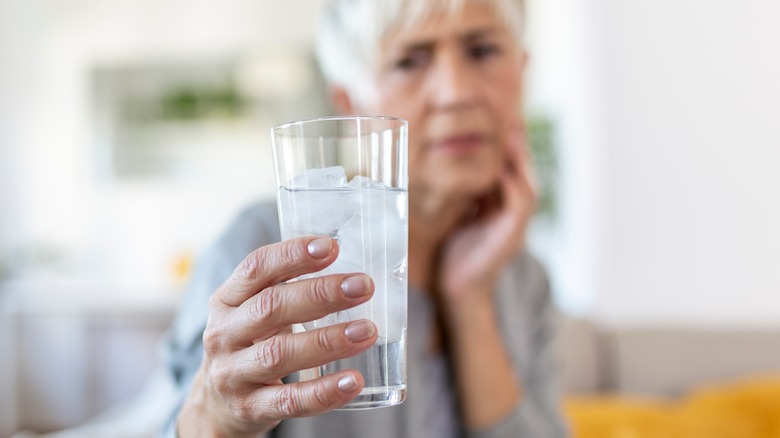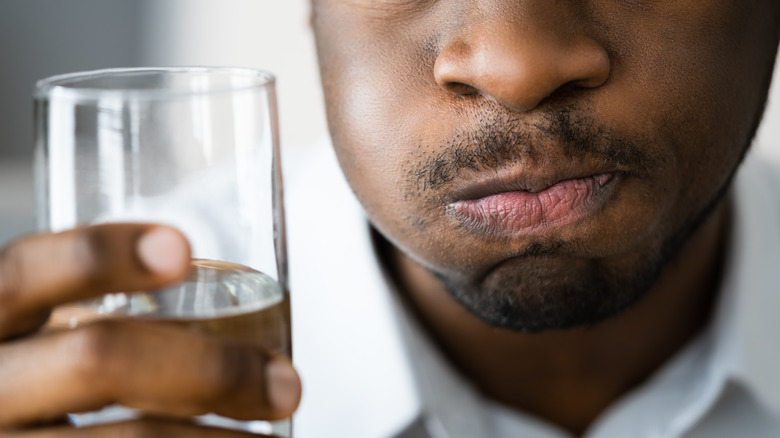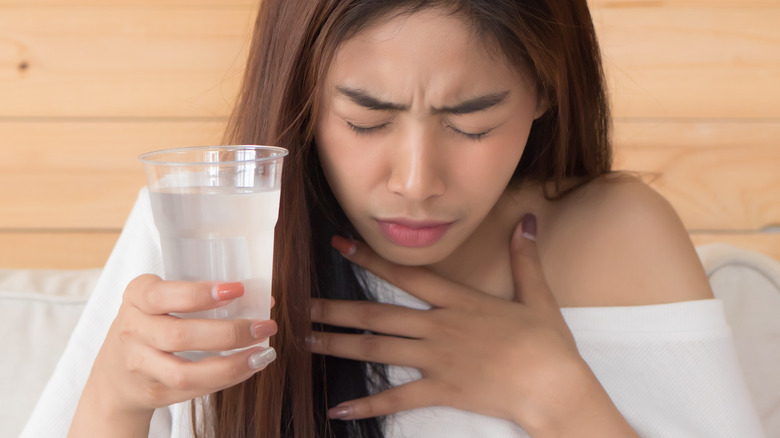Stop The Hiccups Fast With This Easy Cold Water Trick
Why is it that the hiccups always seem to strike at the most inopportune moments? Much like a sneezing fit, once the hiccups start, there's little you can do to stop them. This involuntary bodily response occurs as a result of repetitive spasming of the diaphragm, explains the Cleveland Clinic, and that loud "hic" sound you're desperately trying to smother is the sound of your vocal chords shutting. Although men tend to be more prone to hiccups, they can affect anyone and everyone. Thankfully, a glass of cold water may be all you need to help ease those squeaking sounds coming from your throat. However, the trick is a little more involved than just taking a sip from your cup.
City MD Medical Director Dr. Janette Nesheiwat told Business Insider that cold water eases contractions in the diaphragm by helping the muscle relax as it should. On the other hand, you'll want to avoid hot beverages, alcohol, or carbonated drinks like soda, as these can have the opposite effect and aggravate hiccups. Knowing that, here's what to do once you've prepared your glass of ice water.
Follow these three steps
With more than 51,000 followers on Instagram, Virginia-based physician Dr. Jason Singh offers viewers tips, tricks, and life hacks on everything from managing headaches to nosebleeds, panic attacks, and more. In a video reel, Dr. Singh walks audiences through a three-step hiccup treatment process involving a glass of ice-cold water. First, you'll want to activate your vagus nerve by gargling the water, which will disrupt the body's hiccup messaging. It's the vagus nerve that controls many of our body's involuntary responses (via Cleveland Clinic).
Next, proceed to slowly swallow the water, but not all at once. Instead, swallow small amounts of water, a little bit at a time. Not only will this temporarily alleviate spasming in the diaphragm, but our swallowing reflex will also throw a wrench in the body's hiccup cycle. Finally, once the last of the water in your mouth has been swallowed, hold your breath and "bear down" for a few moments, Dr. Singh says. In other words, direct energy downward through your body by "pushing," much like how a pregnant person is instructed to push when giving birth (via The Cochrane Database of Systematic Reviews). This will alter the body's intrathoracic pressure and inspiration (inhalation) sequence that's prompting your diaphragm spasms and put an end to those frustrating hiccups.
What to do if the cold water trick doesn't work
While the hiccups will most often go away within a few minutes or hours, if you find that they are lingering for several days, it's important to see your doctor to assess for any alternate health conditions. For mild bouts of hiccups, however, if the cold-water trick just isn't cutting it, Cleveland Clinic experts alternatively suggest inhaling and exhaling into a paper bag, pulling softly on your tongue, lightly rubbing your eyeballs, engaging your gag reflex, or swallowing small pieces of bread. Just remember, there are no guarantees that these at-home remedies will work for everyone or every time.
The best way to avoid the hiccups in the first place is to be mindful of habits or behaviors that may trigger them. This includes eating or drinking at a fast pace; overeating; stretching one's neck too far; or experiencing extreme emotions, such as fear, excitement, or stress. Instead, try eating more slowly and in moderation.



